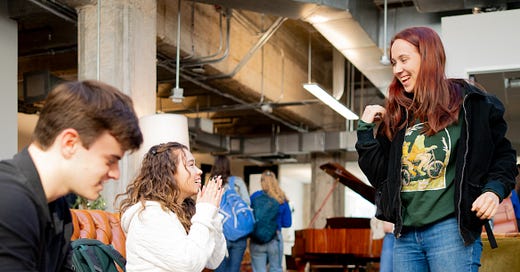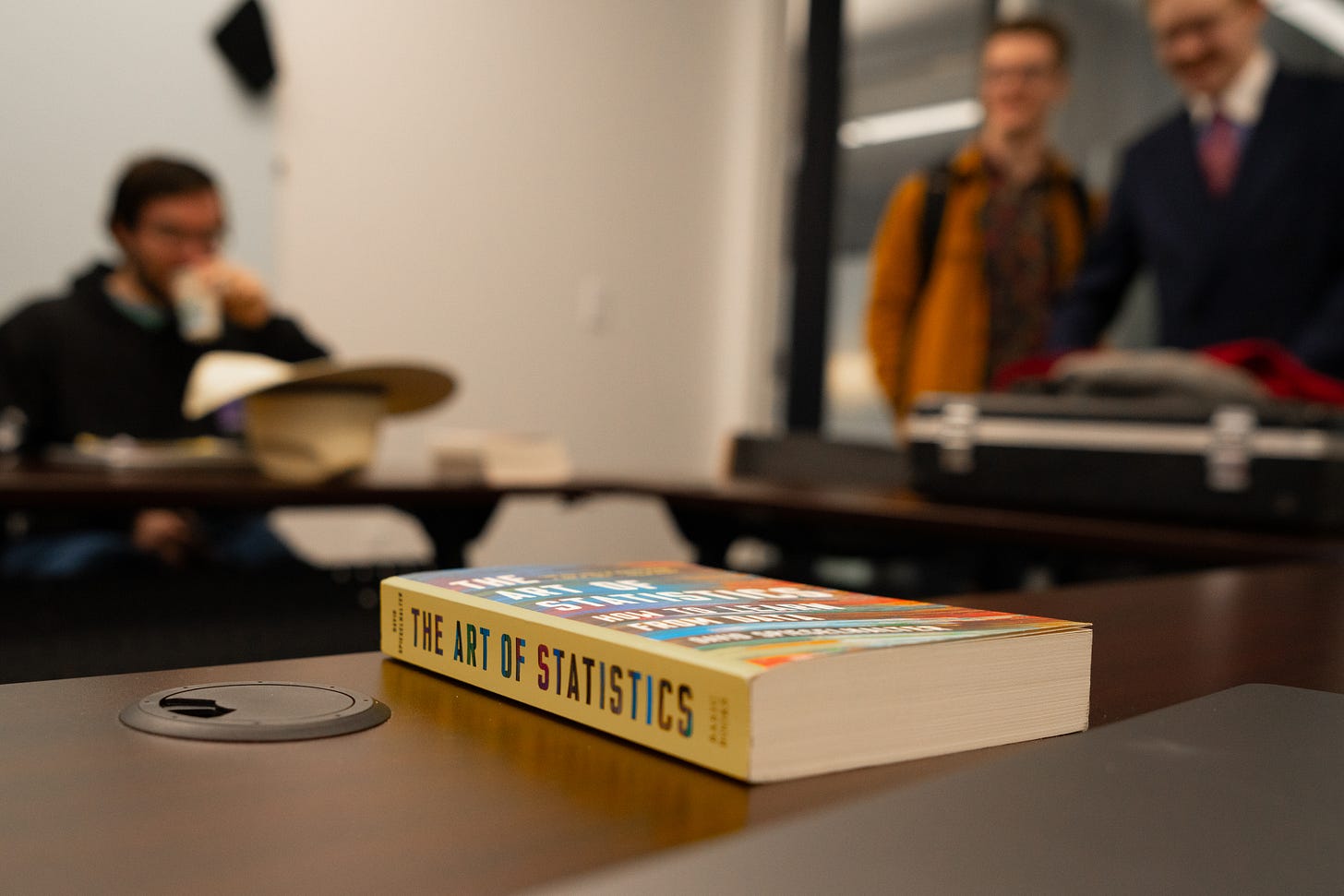Winter has arrived, and with it a new reading list and debate series. In this edition you’ll find plenty of material to keep yourself occupied indoors during Austin’s few cold months, and for those who are keen on venturing out, the Austin Union invites you to a series of debates open to the public—starting tonight!
“In an era where free speech on college campuses is increasingly restricted and the diversity of thought is stifled, the Austin Union was born out of a passionate desire to revive meaningful discourse. The idea was first sparked by Liv Hagye at University of Austin, who sought to create a space where ideas could clash and converge in the pursuit of truth.”
So reads the beginning of the history of the Austin Union (𝕏), the debate society that has made a home for itself at UATX. The Union is now under the complete control of its student council after getting off the ground with the help of Hagye and Dean Morgan Marietta. Their next debate is TONIGHT at 6pm, FREE TO ATTEND and OPEN TO THE PUBLIC. Sign up below, and view the January debate schedule here.
Back by Popular Demand
Grab your library card, or your credit card—we’ve got links to the exact edition of each book we’re reading this term. Without further ado: the winter reading list, organized by course.
Humanities and social sciences
CBR Chair of Politics, Censorship and Free Speech Michael Shellenberger (𝕏) equips students to expose the lies of our day in Pathocracy, his teaching debut at UATX. He’s joined by Coleman Hughes (𝕏) in a guest appearance on the Legacy of Slavery, an empirical look at the long-term consequences of slavery with viewpoints from across the political spectrum. Flying off the library shelves this term: books on politics, history, economics, writing, beauty, Plato, and more Plato.
Pathocracy
San Fransicko: Why Progressives Ruin Cities, Michael Shellenberger
Where Are We Now?: The Epidemic as Politics, Giorgio Agamben
Free Women, Free Men: Sex, Gender, Feminism, Camille Paglia
Legacy of Slavery
Selections from: “The Real History of Slavery”, Thomas Sowell; “The Case for Reparations”, Ta-Nehisi Coates; Shame, Shelby Steele; The New Jim Crow, Michelle Alexander; and more.
The Beginning of Politics
The Republic, Plato
The Five Books of Moses, translated by Robert Alter
Politics, Aristotle
Writing and the English Language
Woe Is I: The Grammarphobe's Guide to Better English in Plain English, Patricia T. O’Conner
The Art of Fiction: Notes on Craft for Young Writers, John Gardner
Foundations of Macroeconomics
Modern Principles of Economics, Cowen and Tabarrok
Introduction to American Politics
The Federalist, Hamilton, Jay, Madison, Carey, and McClellan
The Enduring Debate: Classic and Contemporary Readings in American Politics, Canon, Coleman, and Mayer
Who Are We?: The Challenges to America's National Identity, Samuel P. Huntington
Rise and Fall of Ancient Rome
Aeneid, Virgil
The Sublime and the Beautiful I
Classical Literary Criticism, Oxford World Classics
Plato’s Republic
The Republic, Plato
STEM
Education in the sciences broadens this second term from the initial course offered in the fall. Students learn from Eliah Overbey (𝕏), fresh off of hosting her bioastronautics summit; the Dean himself; and the rest of our STEM faculty.
Quantitative Reasoning II
The Art of Statistics: How to Learn from Data, David Spiegelhalter
Factfulness: Ten Reasons We're Wrong About the World—and Why Things Are Better Than You Think, Rosling, Rosling, and Rosling Rönnlund
Discrete Mathematics
Discrete Mathematics with Applications, Susanna S. Epp
Artificial Intelligence
Artificial Intelligence: A Modern Approach, Norvig and Russell
The Miseducation of Milo Yue
In this podcast, Provost Jacob Howland interviews UATX freshman Milo Yue ’28. Milo shares his compelling journey of growing up in East Palo Alto and navigating an education system rife with inequality, when students from wealthier areas thrived in advanced classes while others were left behind.
A voracious reader with a passion for exploring connections across disciplines, Milo critiques the rigid, standardized structures of traditional education, which often suppress creativity and individual growth. He delves into themes like the decline in basic literacy and numeracy, the shortcomings of modern universities, and the tension between fostering personal development and enforcing conformity.
Would someone you know who is considering college be interested in any of the following?
A debate at the Austin Union
A class with Michael Shellenberger
A conversation with Milo and the Provost
A seminar around one of the great books studied here
If so, have them apply by February 15 to our undergraduate class beginning this fall. Tuition is on our founders.
Stephen Plodinec is the Creative Director of the University of Austin.










Your required reading list is impressive. Most of that was available when I went to college and graduate school in the late 1960s and early 1970s, but I was not required to read them. I had to find them myself.